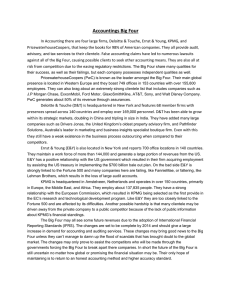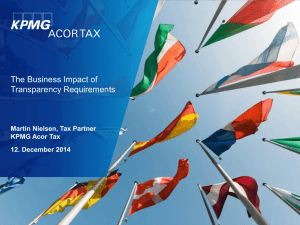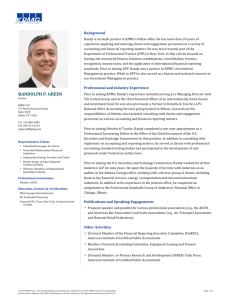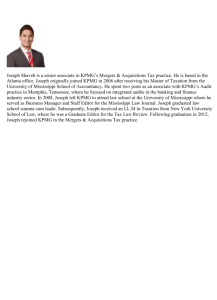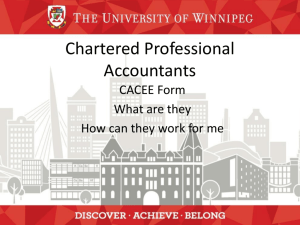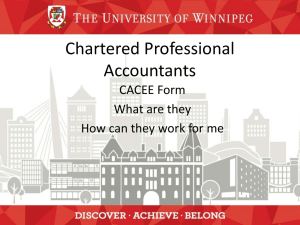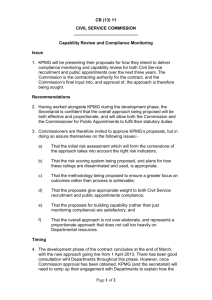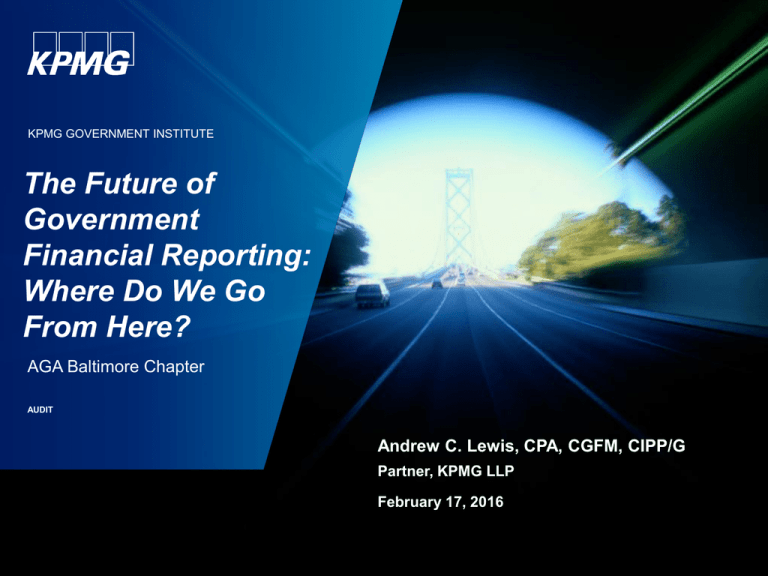
KPMG GOVERNMENT INSTITUTE
The Future of
Government
Financial Reporting:
Where Do We Go
From Here?
AGA Baltimore Chapter
AUDIT
Andrew C. Lewis, CPA, CGFM, CIPP/G
Partner, KPMG LLP
February 17, 2016
Is a discussion on the future exciting?
© 2016 KPMG LLP, a Delaware limited liability partnership and the U.S. member firm of the KPMG network of independent
member firms affiliated with KPMG International Cooperative (“KPMG International”), a Swiss entity. All rights reserved.
1
Or does it invoke fear and worry?
© 2016 KPMG LLP, a Delaware limited liability partnership and the U.S. member firm of the KPMG network of independent
member firms affiliated with KPMG International Cooperative (“KPMG International”), a Swiss entity. All rights reserved.
2
For me, the future is a little more like this . . .
© 2016 KPMG LLP, a Delaware limited liability partnership and the U.S. member firm of the KPMG network of independent
member firms affiliated with KPMG International Cooperative (“KPMG International”), a Swiss entity. All rights reserved.
3
What does financial reporting look like today?
© 2016 KPMG LLP, a Delaware limited liability partnership and the U.S. member firm of the KPMG network of independent
member firms affiliated with KPMG International Cooperative (“KPMG International”), a Swiss entity. All rights reserved.
4
A Comparison of Reporting
State and Local
Government Reporting
Federal Government
Reporting
Framework
GASB 34
OMB Circular A-136
Frequency for
external users
Annual
Annual
Basis of
accounting
Full accrual; modified
accrual; budget-based
Full accrual; budget-based
Level of detail
Very detailed – Individual
fund level
Limited – summary only
Example length of
annual report
~150 pages (City of
Baltimore 2013 CAFR)
~250 pages (SSA 2015 AFR)
Derived
value/performance
reporting
None
Limited
© 2016 KPMG LLP, a Delaware limited liability partnership and the U.S. member firm of the KPMG network of independent
member firms affiliated with KPMG International Cooperative (“KPMG International”), a Swiss entity. All rights reserved.
5
What does the future of financial reporting look like?
What words do you think describe the future state of
government accounting and auditing?
© 2016 KPMG LLP, a Delaware limited liability partnership and the U.S. member firm of the KPMG network of independent
member firms affiliated with KPMG International Cooperative (“KPMG International”), a Swiss entity. All rights reserved.
6
What are the accelerators of change?
Incredible advancements in technology and computing power
© 2016 KPMG LLP, a Delaware limited liability partnership and the U.S. member firm of the KPMG network of independent
member firms affiliated with KPMG International Cooperative (“KPMG International”), a Swiss entity. All rights reserved.
7
What are the accelerators of change?
Availability and instantaneous access of data
© 2016 KPMG LLP, a Delaware limited liability partnership and the U.S. member firm of the KPMG network of independent
member firms affiliated with KPMG International Cooperative (“KPMG International”), a Swiss entity. All rights reserved.
8
What are the accelerators of change?
Availability and instantaneous access of data
© 2016 KPMG LLP, a Delaware limited liability partnership and the U.S. member firm of the KPMG network of independent
member firms affiliated with KPMG International Cooperative (“KPMG International”), a Swiss entity. All rights reserved.
9
What are the accelerators of change?
Tools to visual and manage data
© 2016 KPMG LLP, a Delaware limited liability partnership and the U.S. member firm of the KPMG network of independent
member firms affiliated with KPMG International Cooperative (“KPMG International”), a Swiss entity. All rights reserved.
10
What are the accelerators of change?
Unsustainable current budget deficits and long-term fiscal paths
© 2016 KPMG LLP, a Delaware limited liability partnership and the U.S. member firm of the KPMG network of independent
member firms affiliated with KPMG International Cooperative (“KPMG International”), a Swiss entity. All rights reserved.
11
What are the accelerators of change?
Considerable gulf between
public expectations and its
view of government
performance
Choices between wants and
needs in the context of value
and affordability
Structured consideration of
costs and benefits
© 2016 KPMG LLP, a Delaware limited liability partnership and the U.S. member firm of the KPMG network of independent
member firms affiliated with KPMG International Cooperative (“KPMG International”), a Swiss entity. All rights reserved.
12
Related thought leadership
Establishing Long-Term Sustainability:
Daunting Choices and Shared Sacrifice
Available at http://www.kpmg-institutes.com/institutes/governmentinstitute.html and www.agacgfm.org
© 2016 KPMG LLP, a Delaware limited liability partnership and the U.S. member firm of the KPMG network of independent
member firms affiliated with KPMG International Cooperative (“KPMG International”), a Swiss entity. All rights reserved.
13
Related thought leadership
Attacking the Fiscal Crisis:
What the States Have Taught Us about the Way Forward
Available at http://www.kpmg-institutes.com/institutes/governmentinstitute.html and www.agacgfm.org
© 2016 KPMG LLP, a Delaware limited liability partnership and the U.S. member firm of the KPMG network of independent
member firms affiliated with KPMG International Cooperative (“KPMG International”), a Swiss entity. All rights reserved.
14
What are the obstacles of change?
Skills gaps among current and future workforce
© 2016 KPMG LLP, a Delaware limited liability partnership and the U.S. member firm of the KPMG network of independent
member firms affiliated with KPMG International Cooperative (“KPMG International”), a Swiss entity. All rights reserved.
15
What are the obstacles of change?
Costs of modernization and finance transformation
© 2016 KPMG LLP, a Delaware limited liability partnership and the U.S. member firm of the KPMG network of independent
member firms affiliated with KPMG International Cooperative (“KPMG International”), a Swiss entity. All rights reserved.
16
What are the obstacles of change?
Pace of change of accounting and auditing standards
© 2016 KPMG LLP, a Delaware limited liability partnership and the U.S. member firm of the KPMG network of independent
member firms affiliated with KPMG International Cooperative (“KPMG International”), a Swiss entity. All rights reserved.
17
How can you prepare?
1. Move from the “backroom” to the “board room”
Create
Value?
Preserve
Value?
© 2016 KPMG LLP, a Delaware limited liability partnership and the U.S. member firm of the KPMG network of independent
member firms affiliated with KPMG International Cooperative (“KPMG International”), a Swiss entity. All rights reserved.
19
Related thought leadership
The KPMG Executive Guide to High Performance in Federal
Financial Management
Available at http://www.kpmg-institutes.com/institutes/governmentinstitute.html
© 2016 KPMG LLP, a Delaware limited liability partnership and the U.S. member firm of the KPMG network of independent
member firms affiliated with KPMG International Cooperative (“KPMG International”), a Swiss entity. All rights reserved.
20
2. Help create the next generation of government financial
managers
Preparing for a new workforce
Adopting a human capital framework
–
Organizational alignment
–
Workforce analysis
–
Addressing KSA gaps
–
Attracting and attaining
highly skilled workforces
© 2016 KPMG LLP, a Delaware limited liability partnership and the U.S. member firm of the KPMG network of independent
member firms affiliated with KPMG International Cooperative (“KPMG International”), a Swiss entity. All rights reserved.
21
Related thought leadership
Paving the Way for the Next Generation of Federal Financial Managers to
Answer the ‘Call to Duty’
Available at http://www.kpmg-institutes.com/institutes/governmentinstitute.html and www.agacgfm.org
© 2016 KPMG LLP, a Delaware limited liability partnership and the U.S. member firm of the KPMG network of independent
member firms affiliated with KPMG International Cooperative (“KPMG International”), a Swiss entity. All rights reserved.
22
3. Enhance financial management systems
Continuing big advances in information technology
Shared services
Data standardization
Centralize systems
Simplification
Cloud solutions
Integration with program and enterprise systems
Elimination of one-off and cuff systems
Information as an asset
© 2016 KPMG LLP, a Delaware limited liability partnership and the U.S. member firm of the KPMG network of independent
member firms affiliated with KPMG International Cooperative (“KPMG International”), a Swiss entity. All rights reserved.
23
Related thought leadership
Shared Finance Services and Standardization: Can One Size Fit All?
Available at http://www.kpmg-institutes.com/institutes/governmentinstitute.html and www.agacgfm.org
© 2016 KPMG LLP, a Delaware limited liability partnership and the U.S. member firm of the KPMG network of independent
member firms affiliated with KPMG International Cooperative (“KPMG International”), a Swiss entity. All rights reserved.
24
4. Back to Basics – Effective and efficient internal controls
Technology driven – more effective, more agile, more efficient
Common systems and control platforms
Cyber an ever bigger deal
ERM focus
–
Risk appetite
–
Highest risks
–
Cost / benefit considerations
Continuous monitoring
Greater accountability
© 2016 KPMG LLP, a Delaware limited liability partnership and the U.S. member firm of the KPMG network of independent
member firms affiliated with KPMG International Cooperative (“KPMG International”), a Swiss entity. All rights reserved.
25
Related thought leadership
Don’t Delay—The Time Has Come to Use the Full Potential of Enterprise Risk
Management to Reduce Cost and Enhance Program Delivery
Available at http://www.kpmg-institutes.com/institutes/governmentinstitute.html and www.agacgfm.org
© 2016 KPMG LLP, a Delaware limited liability partnership and the U.S. member firm of the KPMG network of independent
member firms affiliated with KPMG International Cooperative (“KPMG International”), a Swiss entity. All rights reserved.
26
5. Embrace the age of ‘digital’ auditing
Modernizing financial statement audit procedures using ever more high-powered
business intelligence and data analytic tools to continuously audit higher-risk
transactions as they are recorded
Challenges include:
–
Getting access to data
–
Data integrity
Benefits include:
–
Enhanced effectiveness
–
Additional business insights
–
Greater efficiency
–
Better detection of fraud, waste
and abuse
© 2016 KPMG LLP, a Delaware limited liability partnership and the U.S. member firm of the KPMG network of independent
member firms affiliated with KPMG International Cooperative (“KPMG International”), a Swiss entity. All rights reserved.
27
Related thought leadership
Digital Auditing: Modernizing the Government Financial Statement Audit
Approach
Available at http://www.kpmg-institutes.com/institutes/governmentinstitute.html and www.agacgfm.org
© 2016 KPMG LLP, a Delaware limited liability partnership and the U.S. member firm of the KPMG network of independent
member firms affiliated with KPMG International Cooperative (“KPMG International”), a Swiss entity. All rights reserved.
28
What’s your view of the future now?
© 2016 KPMG LLP, a Delaware limited liability partnership and the U.S. member firm of the KPMG network of independent
member firms affiliated with KPMG International Cooperative (“KPMG International”), a Swiss entity. All rights reserved.
29
About the KPMG Government Institute
The KPMG Government Institute was established to serve as a strategic resource
for government at all levels and also for higher education, and nonprofit entities
seeking to achieve high standards of accountability, transparency, and performance.
The Institute is a forum for ideas, a place to share leading practices, and a source
of thought leadership to help governments address difficult challenges, such as
effective performance management, regulatory compliance, and fully leveraging
technology.
http://www.kpmg-institutes.com/institutes/government-institute.html
© 2016 KPMG LLP, a Delaware limited liability partnership and the U.S. member firm of the KPMG network of independent
member firms affiliated with KPMG International Cooperative (“KPMG International”), a Swiss entity. All rights reserved.
30
Contact information
Andrew C. Lewis, CPA, CGFM, CIPP/G
Partner, KPMG LLP
Executive Fellow, KPMG Government Institute
aclewis@kpmg.com
(202) 533-4886
http://www.kpmg-institutes.com/institutes/governmentinstitute.html
The views and opinions expressed herein are those of the author and do not necessarily represent the views and
positions of KPMG LLP. The information contained herein is of a general nature and is not intended to address
the circumstances of any particular individual or entity. Although we endeavor to provide accurate and timely
information, there can be no guarantee that such information is accurate as of the date it is received or that it will
continue to be accurate in the future. No one should act on such information without appropriate professional
advice after a thorough examination of the particular situation.
© 2016 KPMG LLP, a Delaware limited liability partnership and the U.S. member firm of the KPMG network of independent
member firms affiliated with KPMG International Cooperative (“KPMG International”), a Swiss entity. All rights reserved.
31
© 2016 KPMG LLP, a Delaware limited liability
partnership and the U.S. member firm of the KPMG
network of independent member firms affiliated with
KPMG International Cooperative (“KPMG
International”), a Swiss entity. All rights reserved.
The KPMG name and logo are registered trademarks
or trademarks of KPMG International.

